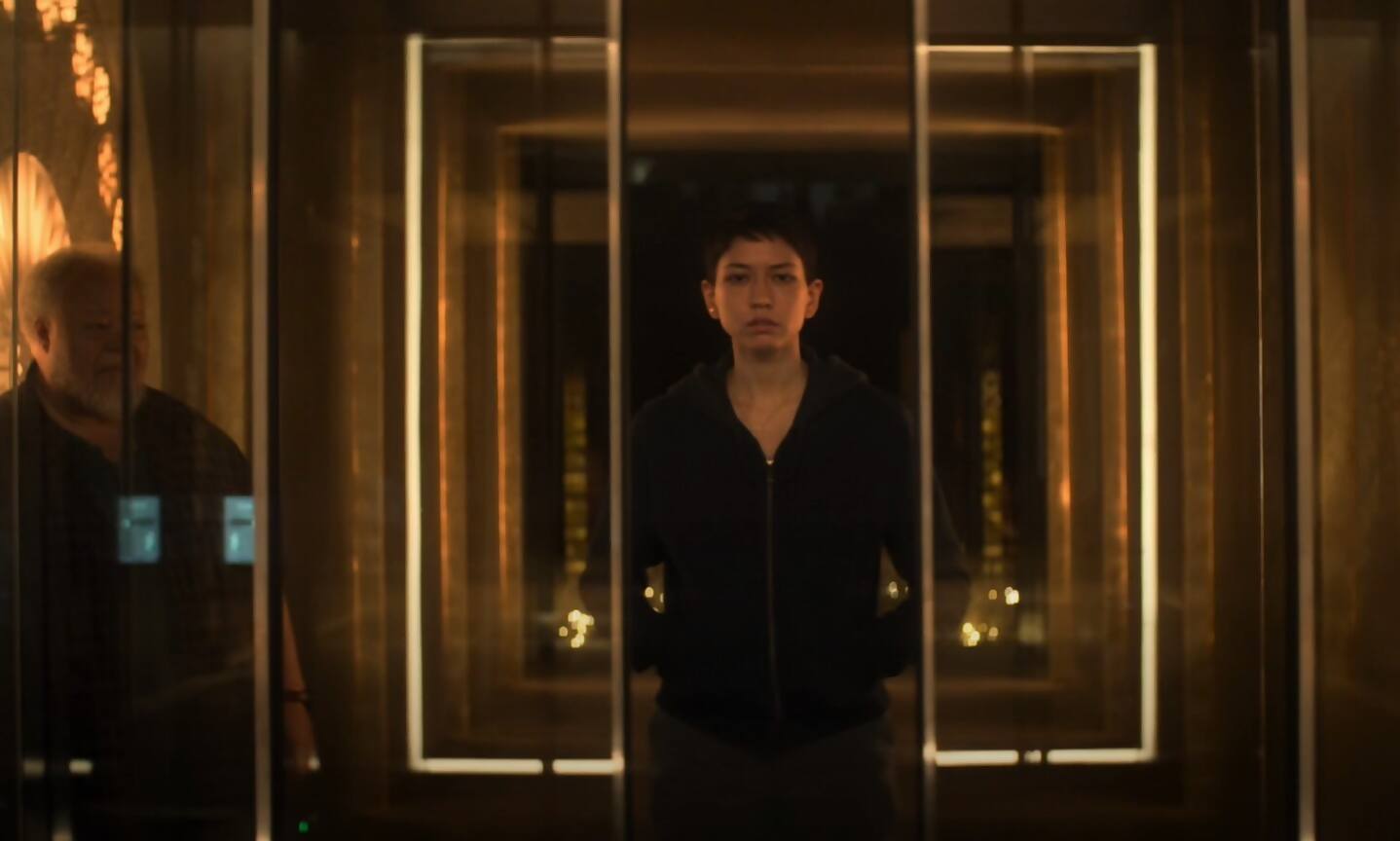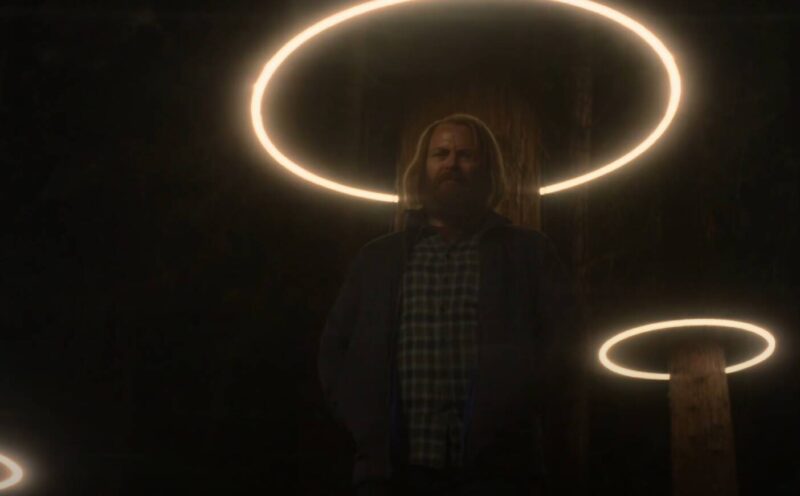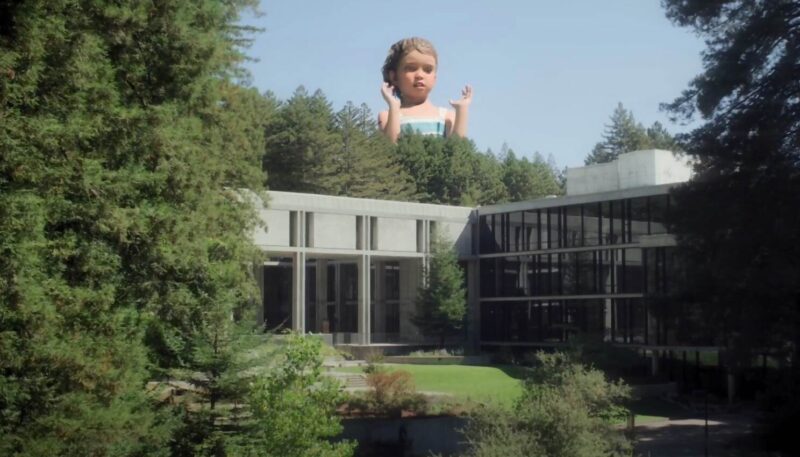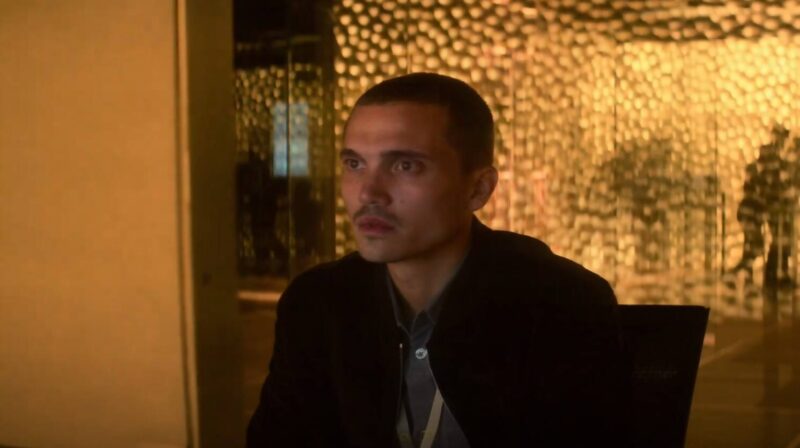
Made five years ago, Alex Garland’s sci-fi TV series Devs looks all the more relevant as AI hits the headlines in 2025.
Ari Aster is worried. The Hereditary and Midsommar director has seen Silicon Valley’s AI arms race, and he doesn’t like where the technology’s heading.
“If you talk to these engineers and the people ushering this AI in, they don’t talk about AI as this great new medium,” Aster said in a recent interview with Letterboxd. “They don’t even talk about it as technology. They talk about it as a god. They talk like disciples. They’re very worshipful of this thing. Whatever space there was between our lived reality and this imaginal reality – that’s disappearing, and we’re merging, and that’s very frightening.”
It’s not as though writer-director Alex Garland didn’t try to warn us. In 2020, his TV series Devs imagined a near future in which a secretive tech company creates an artificially-intelligent supercomputer powerful enough to see into both the past and the future (there’s far more to the plot, which we won’t spoil here). A tense, absorbing sci-fi thriller, Devs also illustrates how tech companies tend to throw out their new inventions with little thought about their broader impact.
Garland’s regular collaborator Sonoya Mizuno plays a young programmer who joins Amaya, a secretive computer firm that works out of a leafy woodland campus. The mystery kicks off when Lily’s boyfriend, Sergei (Karl Glusman), who also just started at the same company, dies under mysterious circumstances late one night. It’s quickly concluded that Sergei was trying to steal company secrets and took his own life; Lily’s doesn’t accept that version of events, and decides to investigate further.
What does CEO Forest (Nick Offerman) know about Sergei’s death? What were the quantum computing team, dubbed Devs, up to in that top-secret building out there in the woods?

Podcast: In conversation with Alex Garland
The series was shot in 2018 and aired in the US in March 2020 on Hulu, before appearing on the BBC a month later. Reviews were positive, but it wasn’t what you’d call a cultural phenomenon. Maybe it’s because the world was in lockdown and wanted more escapist stuff like Tiger King rather than heady sci-fi. Watch Devs in 2025, however, and it’s uncanny just how well it anticipated the climate of breathless hype and anxiety we’re currently all living through.
The concept of the singularity – that is, an artificial intelligence so advanced that it’s capable of iteratively improving itself – has been around since at least the 1950s. In the new hype cycle surrounding artificial intelligence over the last few years, however, the prospect of a new technological epoch powered by AGI (Artificial General Intelligence) has once again entered the conversation.
Paradoxically, tech CEOs are talking about their products in evangelical terms, even as they warn about their potential threats. OpenAI CEO Sam Altman, for example, has referred to his ChatGPT platform as the “magic intelligence in the sky” while also describing AI existential threat to humanity, as pointed out by Vox.
What’s significant about Devs is that it emerged several years before the rise of Open AI’s ChatGPT chatbot and its competitors (ChatGPT launched in late 2022). In 2020, there were AI assistants such as Siri and Alexa, but AI wasn’t yet a popular subject of media discussion; cryptocurrency and NFTs were. The world was in the middle of the pandemic when the show aired, so conversations were more commonly about lockdowns and social distancing. In the US, people were at home, spending their stimulus cheques on Bitcoin, Pokemon cards and Gamestop stocks.

Garland had his ear to the ground, though, and – like Ari Aster – was both fascinated and unnerved by the quasi-religious way in which Silicon Valley talked about AI.
“It was to do with people having religious-type interpretations of the universe,” Garland said when we asked him about Devs for the Film Stories Podcast in June. “So one of them would be, ‘we live in a simulation’ as an example. They were religious-type theories, and […] they would directly relate those to tech.”
Read more: AI | 16 films that have used artificial intelligence, and how
When Garland began writing the series in the late 2010s, he also saw something on the horizon that we’ve seen play out in the media over the past couple of years: as investment has flooded the tech sector, the founders of certain businesses, including Altman and Elon Musk, have been conferred an almost untouchable status.
“These people had made massive amounts of money from tech,” Garland said, “and the money they made was proof of how clever they were. Because how else could you make all this money if you weren’t sort of a genius or special in some way? […] What I found was that, with a lot of these tech leaders, people reacted to them in a similar way that they react around movie stars. Whatever suspicions they had just got completely suppressed.”
This mixture of a messianic sense of purpose and a lack of political oversight has created a climate in which tech companies have been able to push through their innovations at speed, leaving the rest of us scrambling to keep up. Companies such as OpenAI and Midjourney have been accused of committing copyright theft on a mass scale, and for the most part, governments have done nothing to stop them; in the UK, there have even been plans to create new laws so that tech firms can train their software on copyrighted material without seeking permission or compensating the owner.

The overwhelming sentiment seems to be that AI is such a transformative new avenue that any kind of legislation would be a damaging block to its progress. Former politician and ex-Meta executive Nick Clegg, for example, recently said that giving artists the ability to consent to the use of their work would “kill the AI industry in this country overnight.”
It’s part of a wider belief that the world is in a similar situation as it was at the time the first nuclear bomb was constructed in the 1940s: there’s a global rush to create AGI, and multiple companies want to get there first. As a result, billions are being invested, even as critics have warned of AI’s potential dangers – to industries, to data security, to our mental health, to the environment, and more besides.
Proponents of AI, such as Sam Altman, counter that while there are risks, they’re outweighed by the benefits. In a 2024 blog post, Altman wrote about the “dawn of the Intelligence Age” in which “fixing the climate, establishing a space colony, and the discovery of all physics” will all be made possible thanks to AI. He also adds that “we will have superintelligence in a few thousand days.”
Altman isn’t alone in this thinking, either: as numerous outlets have covered, there’s a widespread belief that supercomputers could soon unlock everything from immortality to the secrets of the universe. And if the creation of a god machine capable of granting eternal life sounds weirdly ecclesiastical, then that’s part of a trend that’s been growing for a while now; Anthony Levandowski, a former Google engineer, set up his own AI-worshipping religion called Way of the Future in the mid 2010s. Last year, Arthur Mensch – CEO of AI company, Mistral – warned against the pseudo-religiosity creeping into the AI field.
“The whole AGI rhetoric is about creating God,” Mensch told The New York Times. “I don’t believe in God. I’m a strong atheist. So I don’t believe in AGI.”

In its collective belief that it can create a godlike supercomputer, Silicon Valley – whether it means to or not – is casting itself as the Moses-like mediator between the “magical intelligence in the sky” and ordinary mortals on the ground. They’re the ones uniquely smart enough to decide what’s good or bad for human progress.
Or, as Alex Garland puts it, if a company like OpenAI creates god, then that effectively makes Sam Altman his son.
“The religious type thinking that they end up having is a self-supporting one that puts them in the Jesus role,” Garland said, a note of distaste rising in his voice. “How fucking predictable. And how deeply pathetic and how deeply narcissistic. In a way, you can’t have that thought process unless you’re so self-involved, and you know so little about the past and how religious-type thinking evolves or develops. I was so dismayed by the stupidity of it and the arrogance of it. That’s what Devs came out of.”
Devs is therefore about the attitudes and mindset of the people who create and sell AI, and Garland makes no bones about how ‘balmy’ he finds its mixture of greed and hubris (“I couldn’t stand it. I still can’t”).
As the filmmaker points out, tech is based as much entrepreneurialism as it is on science. AI might be discussed in cosmic terms in some circles, but money remains an overriding factor; one estimate puts the global value of the AI sector at roughly $540bn this year. Investors are pumping ever more money into AI because they believe that it’ll be worth over $1tn by 2027.
Whether a machine god is ever created or not, we’re already seeing how everything from education to medicine has been affected by AI’s recent growth spurt. Some of it – particularly in scientific fields – has looked like genuine progress. Other aspects, such as its impact on education, look decidedly less positive right now. For good or ill, AI is here, and evolving at a rate faster than individuals or governments can adequately mitigate against.
Devs foresaw elements of this future shock over five years ago. Which brings us back round to Ari Aster, who, like Alex Garland before him, has noticed that a new age is being ushered in without any pause for consideration or debate.
“I have a lot of fear regarding this,” Aster said. “It’s obviously already too late. We’re in a race now… something huge is happening right now, and we have no say in it. So, here we go. I can’t believe we’re actually going to live through this and see what happens. Holy cow.”
Devs is currently available to watch on Disney+ in the UK.








